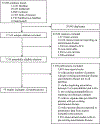A systematic review and meta-analysis of observational studies and uncontrolled trials reporting on the use of checkpoint blockers in patients with cancer and pre-existing autoimmune disease
- PMID: 38834015
- PMCID: PMC11331889
- DOI: 10.1016/j.ejca.2024.114148
A systematic review and meta-analysis of observational studies and uncontrolled trials reporting on the use of checkpoint blockers in patients with cancer and pre-existing autoimmune disease
Abstract
Background: Cancer patients with autoimmune disease have been excluded from randomized trials of immune checkpoint blockers (ICBs). We conducted a systematic review of observational studies and uncontrolled trials including cancer patients with pre-existing autoimmune disease who received ICBs.
Methods: We searched 5 electronic databases through November 2023. Study selection, data collection, and quality assessment were performed independently by 2 investigators. We performed a meta-analysis to pool incidence of immune-related adverse events (irAEs), including de novo events and flares of existing autoimmune disease, hospitalizations due to irAEs, as well as deaths.
Results: A total of 95 studies were included (23,897 patients with cancer and preexisting autoimmune disease). The most common cancer evaluated was lung cancer (30.7 %) followed by skin cancer (15.7 %). Patients with autoimmune disease were more likely to report irAEs compared to patients without autoimmune disease (relative risk 1.3, 95 % CI 1.0 to 1.6). The pooled occurrence rate of any irAEs (flares or de novo) was 61 % (95 % CI 54 % to 68 %); that of flares was 36 % (95 % CI 30 % to 43 %), and that of de novo irAEs was 23 % (95 % CI 16 % to 30 %). Flares were mild (grade <3) in half of cases and more commonly reported in patients with psoriasis/psoriatic arthritis (39 %), inflammatory bowel disease (37 %), and rheumatoid arthritis (36 %). 32 % of the patients with irAEs required hospitalization and treatment of irAEs included corticosteroids in 72 % of the cases. The irAEs mortality rate was 0.07 %. There were no statistically significant differences in cancer response to ICBs between patients with and without autoimmune disease.
Conclusions: Although more patients with pre-existing autoimmune disease had irAEs, these were mild and managed with corticosteroids in most cases, with no impact on cancer response. These results suggest that ICBs can be used in these patients, but careful monitoring is required, as over a third of the patients will experience a flare of their autoimmune disease and/or require hospitalization. These findings provide a crucial foundation for oncologists to refine their monitoring and management strategies, ensuring that the benefits of ICB therapy are maximized while minimizing its risks.
Keywords: Anti–cytotoxic T-lymphocyte-associated protein 4; Anti–programmed cell death protein 1; Anti–programmed death ligand 1; Autoimmune diseases; Immune checkpoint blockers.
Copyright © 2024 Elsevier Ltd. All rights reserved.
Conflict of interest statement
Declaration of Competing Interest The authors declare the following financial interests/personal relationships which may be considered as potential competing interests. Dr. Suarez-Almazor has received consultant fees from participation on advisory boards for Syneos Health and Celgene. All activities are unrelated to this work. Dr. Xerxes Pundole is an employee and shareholder of Amgen, Inc. The remaining authors have no conflict of interest to declare.
Figures
References
-
- Marrone KA, Ying W, Naidoo J. Immune-Related Adverse Events From Immune Checkpoint Inhibitors. Clin Pharmacol Ther 2016; 100(3): 242–51. - PubMed
-
- Hodi FS, Chiarion-Sileni V, Gonzalez R, et al. Nivolumab plus ipilimumab or nivolumab alone versus ipilimumab alone in advanced melanoma (CheckMate 067): 4-year outcomes of a multicentre, randomised, phase 3 trial. Lancet Oncol 2018; 19(11): 1480–92. - PubMed
-
- Schachter J, Ribas A, Long GV, et al. Pembrolizumab versus ipilimumab for advanced melanoma: final overall survival results of a multicentre, randomised, open-label phase 3 study (KEYNOTE-006). Lancet 2017; 390(10105): 1853–62. - PubMed
-
- Herbst RS, Baas P, Kim DW, et al. Pembrolizumab versus docetaxel for previously treated, PD-L1-positive, advanced non-small-cell lung cancer (KEYNOTE-010): a randomised controlled trial. Lancet 2016; 387(10027): 1540–50. - PubMed
Publication types
MeSH terms
Substances
Grants and funding
LinkOut - more resources
Full Text Sources
Medical
Research Materials


